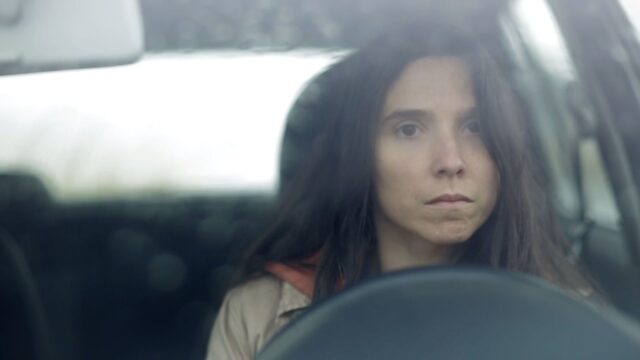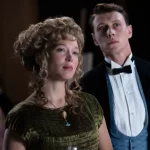AFI Fest 2022: Trenque Lauquen, by Scott Nye

The first of Trenque Lauqen’s twelve chapters is titled “La Aventura.” Given that, like Antonioni’s classic, director Laura Citarella’s new film concerns the sudden disappearance of a young woman and the people who go looking for her, I can’t imagine the associations are entirely accidental. The title card comes early enough that the film’s entrancing mysteries had not yet begun compounding, so I turned briefly nostalgic for the period when I first saw L’Avventura, among many other landmark films of the mid-twentieth century. Most cinephiles experience this sort of “awakening” period, where you find yourself mainlining what are widely considered the best films ever made, a contact high that’s unreasonable to expect to sustain, as it becomes rarer and rarer to encounter something truly, obviously great. Four hours later, as the film concluded, I was convinced I had.
Laura (Laura Paredes) – academic, radio host, and “almost-biologist” local to the title region – is missing, and two men are trying to find her. We immediately gather that Raphael (Raphael Spregelburd), the older of the two, has a personal connection to her, while Ezequiel (Ezequiel Pierri) knows her a bit through work. Those assumptions become complicated through a series of flashbacks, as we find she had been secretly collaborating with Ezequiel on a mystery she had uncovered, a series of letters she found hidden within library books that detail a secret affair held by no one of great importance but someone of terrific fascination. At least to Laura; and, vicariously, to Ezequiel – until they get as far as they can down that rabbit hole, and another emerges.
In less nimble hands, Trenque Lauquen would risk losing track of these intertwined, constantly-complicating developments (a massive stretch of the film’s second half is essentially one long wide-ranging flashback illustrating a recorded message Laura leaves behind). Miguel De Zuviría and Alejo Moguillansky’s editing is key to keeping the momentum headlong – both worked on the 14-hour La Flor and know a thing or two about keeping unwieldy narratives arresting. Their habit of cutting at unexpected times, of assembling montage in a strange, subconsciously-intuitive manner, keeps the feeling of progress in line even when the one-to-one plotting might elude us, an uncertainty Citarella acknowledges and even embraces. At least twice in the film, Ezequiel has to stop a monologue to note he’s lost, only for the speaker to say it really doesn’t matter. The order of its various revelations is often counterintuitive and its unusual mysteries not easily bent to learned structure.
Citarella and Paredes, who wrote the screenplay together, deftly tease out their story in an empathetic manner, focusing it around how it impacts everyone, not worrying if we miss a detail, for the look an actor gives is enough to sell its impact. The countless small personality traits they grant their expansive supporting cast (a discussion of ladder safety in retrieving old books at the library, an older woman referring to her younger pregnant partner as “fatty”, a procession of teachers who are simply delighted that Ezequiel has paid them a visit) not only help prod along this complex narrative, they ground the film in a sense of humanity and connection all its principal characters are seeking. In a way, the very essence of the mystery Laura starts with is born from a desire to connect to someone, somewhere, even if those someones are probably dead and the somewhere was sixty years ago.
Citarella’s association with Mariano Llinás (he is credited here as Executive Producer and possibly in some other capacity) through his prior two films – Extraordinary Stories and La Flor – is a quick reference point for their unusual lengths (Citarella at least contains hers to that which can be reasonably digested in a day) and labyrinthine structures. Trenque Lauquen cuts a little deeper than that, thematically and referentially – go back to her first feature, Ostende, to find the real meaty connections. That one starred Paredes, also playing a woman named Laura, that time stranded at a hotel, waiting for her delayed boyfriend, and trying to learn who the other guests are by observing their habits and listening in on their conversations.
A decade later, Laura is doing the same thing, only further into the past, still trying to derive meaning from strangers, accidentally bestowing meaning on friends and lovers, and coming to terms with how difficult and complicated it becomes to assume any kind of ownership of either. Citarella remains fascinated with the way behavior and habit imply preference, with the gaps that develop between people due to chance and circumstance; and maybe most tellingly, with the way people generally and women especially have to keep up certain appearances regardless of their own changing desires and dilemmas. Otherwise, someone – some man – might get “concerned” or “worried,” the sensitive-male way of forming ownership over a woman’s time and attention. Even the structure of the film suggests a supportive role women can start to assume in their own lives, and it takes each new chapter to complicate the meaning behind Laura’s disappearance, though we come to learn, as these things tend to go in our own lives, that the outer mystery could hardly resolve the inner one.
The last stretch – when the film takes a rather sudden aesthetic shift on several fronts – shifts the film into at once its simplest state and also its boldest, a final journey into what it all meant, if it in fact meant anything at all. The whole film operates in such an intuitive, subconscious way that I couldn’t begin to explain to myself until these final moments why the film was having such a profound, spiritual effect, and whatever I’ve said here about loneliness, longing, and striving for connection are but the slightest of emotional grounding on which I could rest my case. I left it not wanting to talk about it with anyone for fear of breaking down, and went for a walk around the festival grounds, thinking about everyone I’ve known, and hoping I did.




























